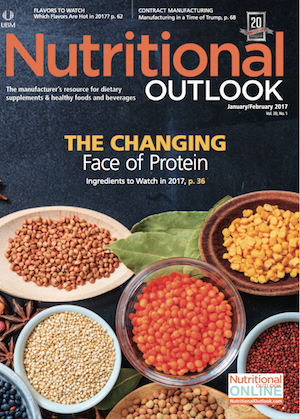2017 Ingredient Trends to Watch for Food, Drinks, and Dietary Supplements: Adaptogens for Stress Relief
Adaptogenic herbs like ashwagandha are making waves in supplement products for stress relief with support from recent research.
Photo © iStockphoto.com/BartekSzewczyk

Supplement products geared toward stress relief are an up-and-coming sight on store shelves, and few ingredient categories are better positioned to capitalize on this emerging trend than adaptogens. Adaptogenic herbs often hail from areas with harsh climactic conditions, such as the Peruvian mountain tops where maca (Lepidium meyenii) grows or the deserts ashwagandha (Withania somnifera) is native to. The same bioactive components that allow those plants to withstand environmental stressors may also help people in dealing with stress of their own, explains Kartikeya Baldwa, director of Ixoreal Biomed (Los Angeles).
In particular, ashwagandha is making its way to the front of the pack, with some of the most impressive sales growth in the adaptogenic-herb category. SPINS reports that ashwagandha sales grew by more than 57% over the past year to arrive at a total market value of $9.5 million-a figure that’s sure to grow as more research emerges.1
Companies invested in studying the benefits of ashwagandha are reaping the rewards. Natreon’s (New Brunswick, NJ) Sensoril ingredient, which combines extracts from both ashwagandha roots and leaves, has been researched for its potential to significantly reduce several parameters of stress and anxiety, including irritability, inability to concentrate, feelings of impending doom, and serum cortisol levels.
Aparna Kalidindi, PharmD, manager of technical sales and marketing for Natreon, says stress relief is “one of the most researched health areas for adaptogenic herbs,” and Sensoril has experienced “ever-growing sales” in the 15 years it has been marketed in the United States for stress relief.
Ixoreal Biomed’s KSM-66 ashwagandha has appeared in three completed clinical studies for stress relief, including a recent trial2 that found KSM-66 may reduce excessive eating associated with chronic stress in overweight adults. The firm has two more stress-relief trials ongoing, including a multicenter study on KSM-66 that will span sites in five different countries.
“This study will involve over 1000 subjects of different ethnicity, nationality, and income level, and in fact will be the largest-ever study on any adaptogen for stress relief,” says Baldwa, adding that “I do expect 2017 to be a strong year for research into adaptogens for stress relief.”
Aside from ashwagandha, Baldwa points to other adaptogenic herbs such as rhodiola (Rhodiola rosea) and maca for their high potential on the stress-relief market. Natreon’s Kalidindi also places Asian ginseng (Panaxginseng), holy basil (Ocimum sanctum), and Astragalus root on that list. What’s more, stress-relief products are increasingly combining multiple adaptogens, such as ashwagandha and rhodiola, to create a “synergistic effect resulting in decreased stress levels and an increase in energy levels,” Kalidindi explains. Watch for these sorts of adaptogen combos to continue advancing in the stress-relief market in the year ahead.
Read more:
Dietary Supplements for Stress-Related Burnout
2017 Ingredient Trends to Watch for Food, Drinks, and Dietary Supplements: Turmeric and Boswellia
Natural Ingredients for Energy Dietary Supplements
2017 Ingredient Trends to Watch for Food, Drinks, and Dietary Supplements:
Plant Protein vs. Dairy Protein
Hemp CBD, Vinpocetine, and Kratom
Michael Crane
Associate Editor
Nutritional Outlook Magazine
michael.crane@ubm.com
References:
1. Sales numbers are courtesy of SPINS and cover the 52 weeks ending November 27, 2016. Statistics are derived from a cross-channel aggregate data pull of multi-outlet, natural, and specialty-gourmet retailers of the total U.S. market.
2. Choudhary D et al., “Body weight management in adults under chronic stress through treatment with ashwagandha root extract: a double-blind, randomized, placebo-controlled trial,” Journal of Evidence-Based Complementary & Alternative Medicine. Published online April 6, 2016.


























